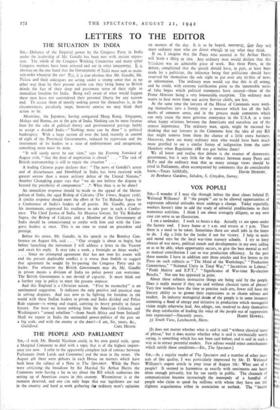THE SITUATION IN INDIA
LETTERS TO THE EDITOR
Sta,—Defiance of the Imperial power by the Congress Party in India under the leadership of Mr. Gandhi has been met with instant repres- sion. The whole of the Congress Working Committee and many other Congress workers have been arrested and are in strict internment. It is obvious on the one hand that the Government of India must seek to main- tain order whatever the cost But, it is aiso obvious that Mr. Gandhi, Mr. Nehru and their colleagues are acting under a strong sense that in no other way than by their present action can they bring home to British minds the fact of their deep and passionate sense of their right to immediate freedom for India. Being well aware of what would happen these men have not surrendered their personal liberty for any narrow end. To accuse them of merely seeking power for themselves is, in the circumstances, peculiarly inept, however unwise we may think their action to be.
Meantime, the Japanese, having conquered Hong Kong, Singapore, Malaya and Burma, are at the gate of India. Nothing can be more fatuous than for the sake of political theory and governmental prestige feebly to accept a divided India—" Nothing more can be done " is political bankruptcy. With a large section all over the land, recently in control of eight of the Provincial Governments, reduced by repression and the internment of its leaders to a state of embitterment and antagonism, something more must be done.
" It will surely never be our view," says the Evening Standard of August L tth, " that the door of negotiation is closed." . . . " The task of British statesmanship is still to repair the situation " . . .
A leading Chinese paper declares that: "The news of Gandhi's arrest and of disturbances and bloodshed in India has been received with greater sorrow than a major military defeat of the United Nations." Another Chungking paper says that " we do not believe the dispute is beyond the possibility of compromise." . .*. What then is to be done?
An immediate response should be-made to the appeal of the Metro- politan of India, the aged Bishop of Calcutta (The Times, August th). A similar response should meet the effort of Sir Tej Bahadur Sapru for a Conference of India's leaders of all parties. Mr. Gandhi, prior to his internment, expressed his readiness to take part in such a Confer- ence. The Chief Justice of India, Sir Maurice Gwyer, Sir Tej Bahadur Sapru, the Bishop of Calcutta and a Member of the Government of India should be commissioned to confer with him and with the Con- gress leaders at once. This is no time to stand on precedent and prestige.
Before his arrest, Mr. Gandhi, in his speech to the Bombay Con- ference on August 8th, said . . . " Our struggle is about to begin, but before launching the movement I will address a letter to the Viceroy and await his reply. It may take a week, a fortnight or three weeks." . . . Since no attempted agreement that has not won his assent will end the present deplorable conflict it is worse than foolish to suggest that agreement be sought by by-passing the Congress Party - and its leader. For whatever the British Government may do, Mr. Gandhi in prison means a division of India no police power can overcome. The British Government is not devoid of capacity. It must -think out a further step in policy to meet the present impasse.
And this England is a Christian nation. " First be reconciled " is no
sentimental suggestion. It indicates the only positive and practical step in solving disputes. And just now to be fighting for freedom in the world with these Indian leaders in prison and India divided and Police Rule regnant—is wrong and stupid, carrying its heavy penalty in future history. For have we learnt nothing from the American Colonies and Washington's " armed rebellion "—from South Africa and from Ireland?
Shall we repeat in India the outmoded power-politics of the past on a big scale, and with the enemy at the door?—I am, Sir, yours, &c.,


























 Previous page
Previous page